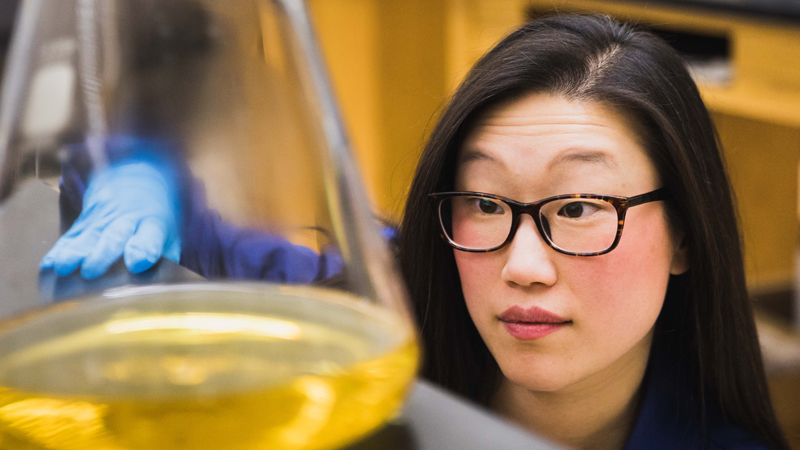Chemistry Immersion
- RIT /
- Rochester Institute of Technology /
- Academics /
- Chemistry Immersion
Overview for Chemistry Immersion
All of the required or optional courses for the chemistry immersion are core chemistry courses within the chemistry curriculum.
Notes about this immersion:
- This immersion is closed to students majoring in biochemistry and chemistry.
The plan code for Chemistry Immersion is CHEM-IM.
Featured Profiles
Your Partners in Success: Meet Our Faculty, Dr. Michel
Dr. Lea Vacca Michel
Dr. Michel strives to increase the participation of women and underrepresented minorities (including deaf and hard-of-hearing people) in science and math while creating an inclusive research...
Curriculum for 2023-2024 for Chemistry Immersion
Current Students: See Curriculum Requirements
| Course | |
|---|---|
| Prerequisites | |
| CHMG-141 | General & Analytical Chemistry I This is a general chemistry course for students in the life and physical sciences. College chemistry is presented as a science based on empirical evidence that is placed into the context of conceptual, visual, and mathematical models. Students will learn the concepts, symbolism, and fundamental tools of chemistry necessary to carry on a discourse in the language of chemistry. Emphasis will be placed on the relationship between atomic structure, chemical bonds, and the transformation of these bonds through chemical reactions. The fundamentals of organic chemistry are introduced throughout the course to emphasize the connection between chemistry and the other sciences. Lecture 3 (Fall, Spring, Summer). |
| CHMG-145 | General & Analytical Chemistry I Lab The course combines hands-on laboratory exercises with workshop-style problem sessions to complement the CHMG-141 lecture material. The course emphasizes laboratory techniques and data analysis skills. Topics include: gravimetric, volumetric, thermal, titration and spectrophotometric analyses, and the use of these techniques to analyze chemical reactions. (Corequisite: CHMG-141 or CHMG-131 or equivalent course.) Lab 3 (Fall, Spring, Summer). |
| CHMG-142 | General & Analytical Chemistry II The course covers the thermodynamics and kinetics of chemical reactions. The relationship between energy and entropy change as the driving force of chemical processes is emphasized through the study of aqueous solutions. Specifically, the course takes a quantitative look at: 1) solubility equilibrium, 2) acid-base equilibrium, 3) oxidation-reduction reactions and 4) chemical kinetics. (Prerequisites: CHMG-141 or CHMG-131 or equivalent course.) Lecture 3 (Fall, Spring, Summer). |
| CHMG-146 | General & Analytical Chemistry II Lab The course combines hands-on laboratory exercises with workshop-style problem sessions to complement the CHMG-142 lecture material. The course emphasizes the use of experiments as a tool for chemical analysis and the reporting of results in formal lab reports. Topics include the quantitative analysis of a multicomponent mixture using complexation and double endpoint titration, pH measurement, buffers and pH indicators, the kinetic study of a redox reaction, and the electrochemical analysis of oxidation reduction reactions. (Prerequisites: CHMG-131 or CHMG-141 or equivalent course.
Corequisites: CHMG-142 or equivalent course.) Lab 3 (Fall, Spring, Summer). |
| or | |
| CHMG-131 | General Chemistry for Engineers This rigorous course is primarily for, but not limited to, engineering students. Topics include an introduction to some basic concepts in chemistry, stoichiometry, First Law of Thermodynamics, thermochemistry, electronic theory of composition and structure, and chemical bonding. The lecture is supported by workshop-style problem sessions. Offered in traditional and online format. Lecture 3 (Fall, Spring). |
| or | |
| CHEM-171 | General Chemistry Advanced General Chemistry designed for aspiring chemical professionals. Students will learn the fundamental concepts that support a modern understanding of chemistry. Atomic and molecular structures are presented and investigated using quantum mechanics. The relationship between quantum mechanics, molecular structure, and material properties is emphasized. (Co-requisites: CHEM-175 and (MATH-171 or MATH-181) or equivalent courses.) Lecture 3 (Fall). |
| Required course | |
| CHMO-231 | Organic Chemistry I This course is a study of the structure, nomenclature, reactions and synthesis of the following functional groups: alkanes, alkenes, alkynes. This course also introduces chemical bonding, IR and NMR spectroscopy, acid and base reactions, stereochemistry, nucleophilic substitution reactions, and alkene and alkyne reactions. In addition, the course provides an introduction to the use of mechanisms in describing and predicting organic reactions. (Prerequisites: CHMG-142 or CHMG-131 or equivalent course.
Corequisites: CHMO-235 or equivalent course.) Lecture 3 (Fall, Spring, Summer). |
| Electives | |
| Choose two of the following: | |
| CHMA-215 | Quantitative Analysis This laboratory is designed for chemistry and biochemistry majors or those interested in pursuing a minor in chemistry. Experiments include statistics, calibration of equipment, spectroscopy, volumetric analyses, kinetics, Gran Plot, double endpoint titrations, potentiometric titration, photometric determination of copper, and water hardness. (Prerequisites: (CHEM-172 and CHEM-176) or (CHMG-142 and CHMG-146) or (CHEM-151 and CHEM-155) or equivalent courses.
Co-requisites: CHMA-211 or equivalent course.) Lab 4 (Fall). |
| CHMA-315 | Instrumental Analysis This course presents hands-on experience with modern chemical instrumentation including a number of spectroscopic techniques, mass spectrometry, gas chromatography, high performance liquid chromatography, and other. The course will cover the theory of operation of each instrument, their capabilities, and their limitations. Students will perform experiments utilizing modern chemical instrumentation and gain experience in analyzing data and presenting experimental results. (Prerequisites: CHMA-211 or CHMA-161 or CHMG-142 or equivalent course.
Co-requisites: CHMA-311 or equivalent course.) Lab 3 (Fall). |
| CHMB-402 | Biochemistry I This course introduces the structure and function of biological macromolecules and their metabolic pathways. The relationship between the three-dimensional structure of proteins and their function in enzymatic catalysis will be examined. Membrane structure and the physical laws that apply to metabolic processes will also be discussed. (Prerequisite: CHMO-231 or CHMO-331 or equivalent course.) Lecture 3 (Fall, Spring, Summer). |
| CHMI-351 | Descriptive Inorganic Chemistry This course covers descriptive inorganic reactions in terms of periodic trends. Topics will include nucleosynthesis and the birth of the universe, applications used in large-scale industrial processes and their environmental impacts, nanostructured materials, and bonding theory will also be discussed. A detailed study of solid-state chemistry and structure will also be addressed. (Prerequisite: CHMO-231 or CHMO-331 or equivalent course.) Lecture 3 (Fall, Spring, Summer). |
| CHMO-232 | Organic Chemistry II This course is a continuation of the study of the structure, nomenclature, reactions and synthesis of the following functional groups: aromatic systems, alcohols, ethers, epoxides, and carbonyls. This course will introduce the use of mechanisms in describing and predicting organic reactions. (Prerequisites: CHMO-231 or CHMO-331 or equivalent course.
Corequisites: CHMO-236 or equivalent course.) Lecture 3 (Fall, Spring). |











